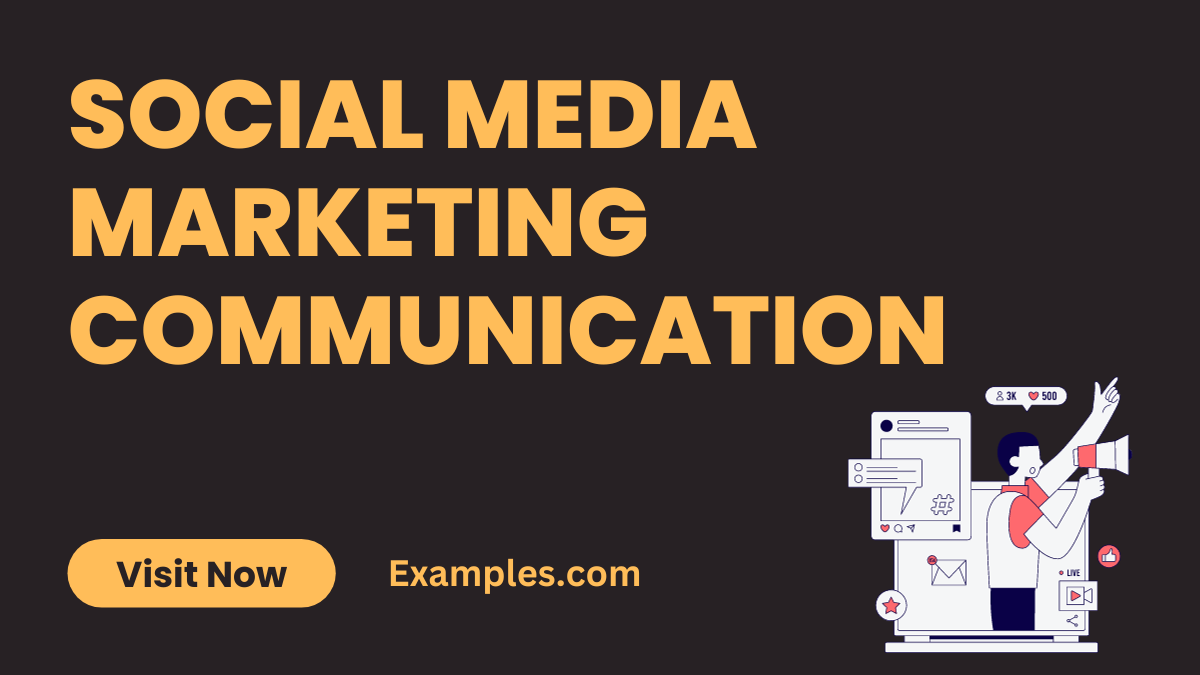19+ Social Media Marketing Communication Examples
Effective Marketing Communication via social media platforms is pivotal in today’s digital landscape. Leveraging various channels and strategies is key. Exploring Communication Examples elucidates diverse methods, like content marketing, influencer partnerships, and SEM strategies. These highlight the significance of interactive, targeted approaches. Understanding the Purpose of Marketing Communication in this realm aids in optimizing campaigns. Explore how Social Media becomes a linchpin in broader Marketing Communication Strategies, influencing brand visibility and consumer engagement.
Download List of Social Media Marketing Communication
What is Social Media Marketing Communication?
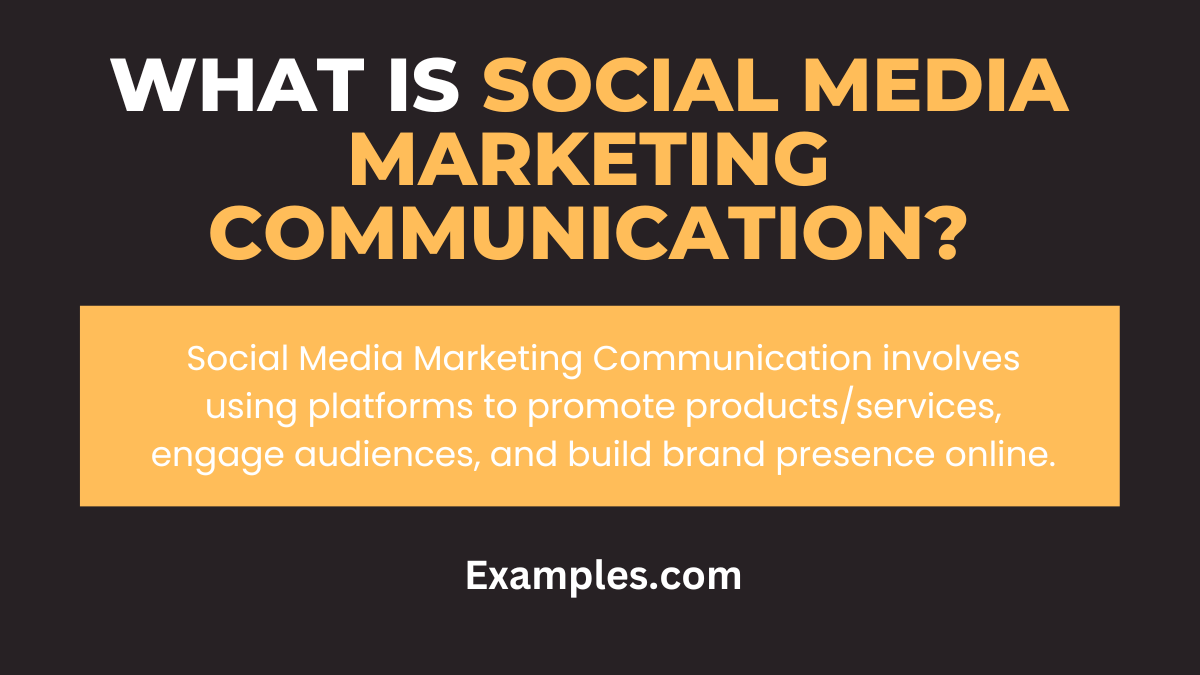
Social Media Marketing Communication refers to the deliberate use of various communication channels and strategies within social media platforms to promote products, services, or messages. Marketing Communication Examples,
Marketing Communication Plans, and Marketing Communication Strategies are pivotal aspects in establishing connections and engagement with audiences, leveraging the diverse landscape of social media platforms.
What is the Best Example of Social Media Marketing Communication?
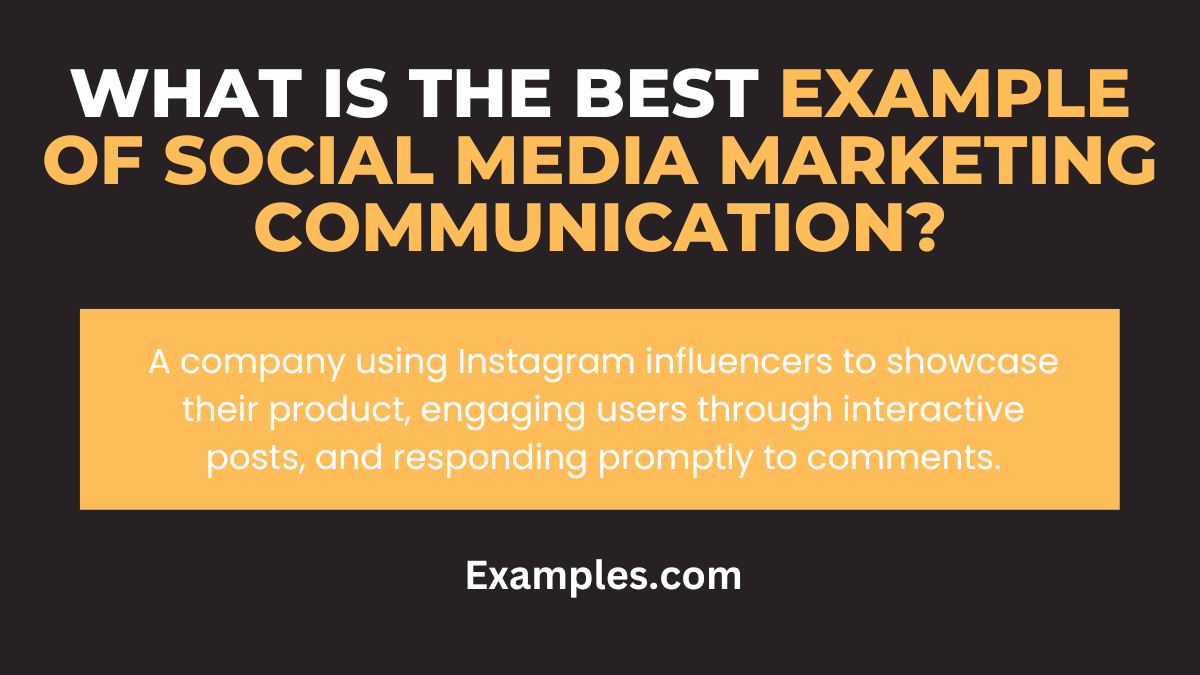
One exemplary instance of Social Media Marketing Communication involves the creation of interactive and shareable content that resonates deeply with the target audience. For instance, a brand orchestrating a viral campaign integrating user-generated content to foster community engagement and loyalty showcases the pinnacle of successful Social Media Marketing Communication.
20 Examples of Social Media Marketing Communication
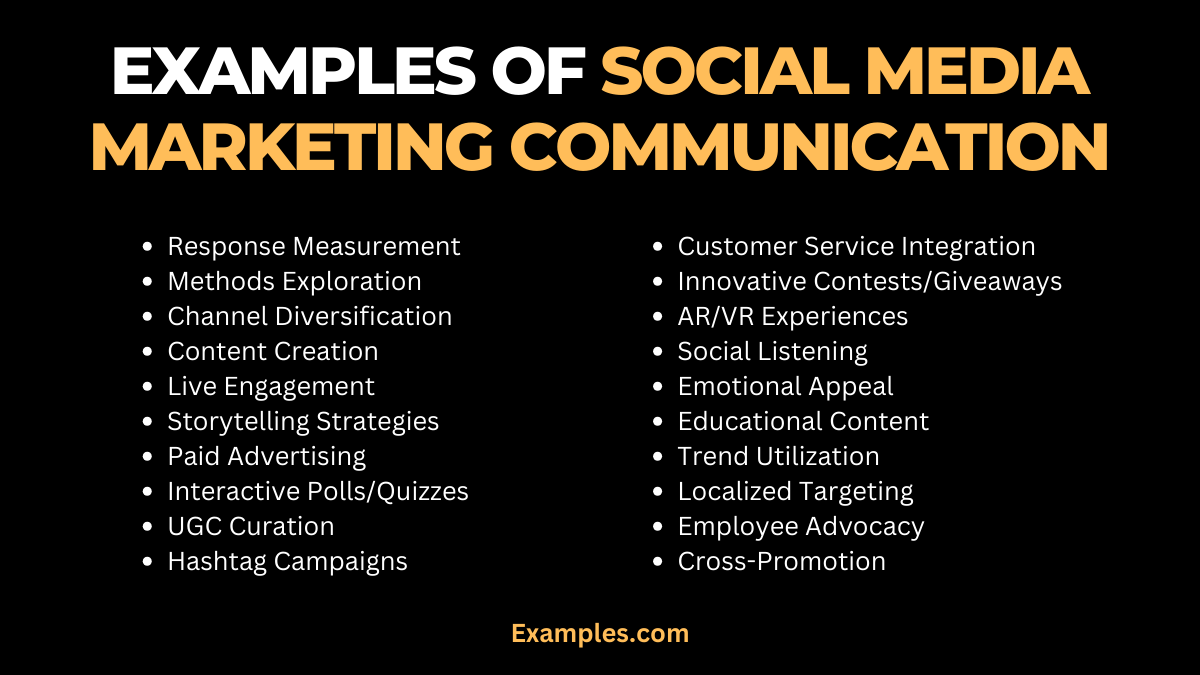
Social media marketing communication amalgamates diverse techniques and platforms to connect brands with their audience. By harnessing social networks, it amplifies brand visibility, fosters engagement, and cultivates lasting relationships. Utilizing interactive content, targeted ads, and influencer partnerships, it navigates diverse channels to resonate with consumers, spark conversations, and drive conversions. Crafting compelling narratives, visuals, and interactive experiences, it transforms mere users into loyal brand advocates.
- Response Measurement: Employ analytics tools to track engagement metrics, such as likes, shares, and comments, gauging campaign effectiveness.
- Methods Exploration: Leveraging influencer collaborations, engage micro-influencers for niche audience targeting, maximizing reach and authenticity.
- Channel Diversification: Utilize multiple platforms – Facebook, Instagram, Twitter – tailoring content to suit each audience and optimize reach.
- Content Creation: Curate user-generated content, fostering community participation and authentic brand advocacy.
- Live Engagement: Host live sessions, Q&A’s, and behind-the-scenes content, fostering real-time interaction and authenticity.
- Storytelling Strategies: Develop cohesive brand stories, aligning them with consumer aspirations and values.
- Paid Advertising: Utilize targeted ads, leveraging demographic and interest-based targeting for precise audience engagement.
- Interactive Polls/Quizzes: Engage users with interactive content, encouraging participation and feedback.
- UGC Curation: Showcase user-generated content, fostering a sense of community and authenticity.
- Hashtag Campaigns: Launch branded hashtags to encourage user participation and virality.
- Customer Service Integration: Provide seamless customer service via social media platforms, addressing queries and concerns promptly.
- Innovative Contests/Giveaways: Host contests or giveaways to boost engagement and brand visibility.
- AR/VR Experiences: Employ augmented reality or virtual reality experiences to enhance engagement.
- Social Listening: Monitor conversations and trends, leveraging insights for strategic content creation and engagement.
- Emotional Appeal: Craft emotive content that resonates with the audience’s emotions, fostering connections.
- Educational Content: Share informative and educational content, establishing authority and trust.
- Trend Utilization: Capitalize on current trends and viral content, aligning them with brand messaging.
- Localized Targeting: Tailor content to local preferences and cultures for enhanced relevance.
- Employee Advocacy: Encourage employees to advocate for the brand, amplifying reach and authenticity.
- Cross-Promotion: Collaborate with complementary brands for mutually beneficial campaigns, expanding reach and visibility.
The Evolution of Marketing Communication in the Social Media Era
The landscape of marketing communication has undergone a dramatic transformation with the advent of social media. Traditionally, marketing efforts were confined to limited channels like print, television, and radio. However, the social media era has revolutionized this domain, introducing new dynamics and possibilities. Social media marketing communication has emerged as a pivotal component, allowing brands to engage directly with their audience in real-time. This shift marks a significant departure from conventional marketing communication strategies, where messages were often one-directional.
The process of marketing communication in the digital age revolves around interactivity and user engagement. Social media platforms serve as dynamic marketing communication channels, enabling brands to create personalized and targeted content. This evolution has led to the development of diverse types of marketing communication within social media, such as influencer marketing, content marketing, and direct consumer engagement. The purpose of marketing communication has also expanded, focusing not just on selling products but on building brand narratives and fostering community.
Moreover, marketing communication in the social media era has necessitated the need for robust marketing communication plans. Companies are now required to be more agile and responsive to the ever-changing social media landscape. The marketing communication objectives have shifted towards gaining insights from customer interactions and using these learnings to refine future strategies. This era has ushered in an unprecedented level of customer-centricity in marketing communication examples, making it a critical factor for the success of modern marketing campaigns.
Why is Social Media Marketing Communication Powerful?
Social media marketing communication has revolutionized the way brands interact with their audience. Here are eight reasons why it’s so powerful:
- Wide Reach: Social media platforms like Facebook, Instagram, and Twitter allow businesses to reach a global audience instantly. This expansive reach is unparalleled in traditional marketing communication channels.
- Targeted Advertising: Platforms offer advanced targeting options, allowing businesses to tailor their Marketing Communication Strategies to specific demographics, interests, and behaviors.
- Cost-Effectiveness: Compared to traditional Marketing Communication Channels, social media marketing is relatively inexpensive, making it accessible for businesses of all sizes.
- Engagement: Social media fosters direct interaction between brands and consumers, enhancing customer engagement and loyalty.
- Real-time Communication: Social media enables instant communication, allowing businesses to respond quickly to customer inquiries, feedback, and market trends.
- Brand Building: It’s an excellent tool for building brand awareness and identity. Through creative content and consistent Marketing Communication Plans, businesses can establish a strong online presence.
- Measurable Results: The Process of Marketing Communication on social media is quantifiable. Analytics tools provide insights into campaign performance, audience demographics, and engagement metrics.
- Influencer Partnerships: Collaborating with influencers can amplify a brand’s reach and credibility, as part of an effective Marketing Communication Framework.
Advantages and Disadvantages of Social Media Marketing Communication
| Advantages | Disadvantages |
|---|---|
| Broad Audience Reach | Potential for Negative Feedback |
| High Engagement Levels | Requires Consistent Content Creation |
| Cost-Effective Marketing | Risk of Miscommunication |
| Targeted Advertising Options | Time-Consuming Management |
| Real-Time Customer Feedback | Platform Dependency |
| Enhanced Brand Awareness | Privacy and Security Concerns |
| Access to Valuable Customer Insights | Rapidly Changing Platform Algorithms |
| Opportunities for Creative and Viral Content | Potential for Brand Image Damage Due to Missteps |
Benefits of Social Media Marketing Communication
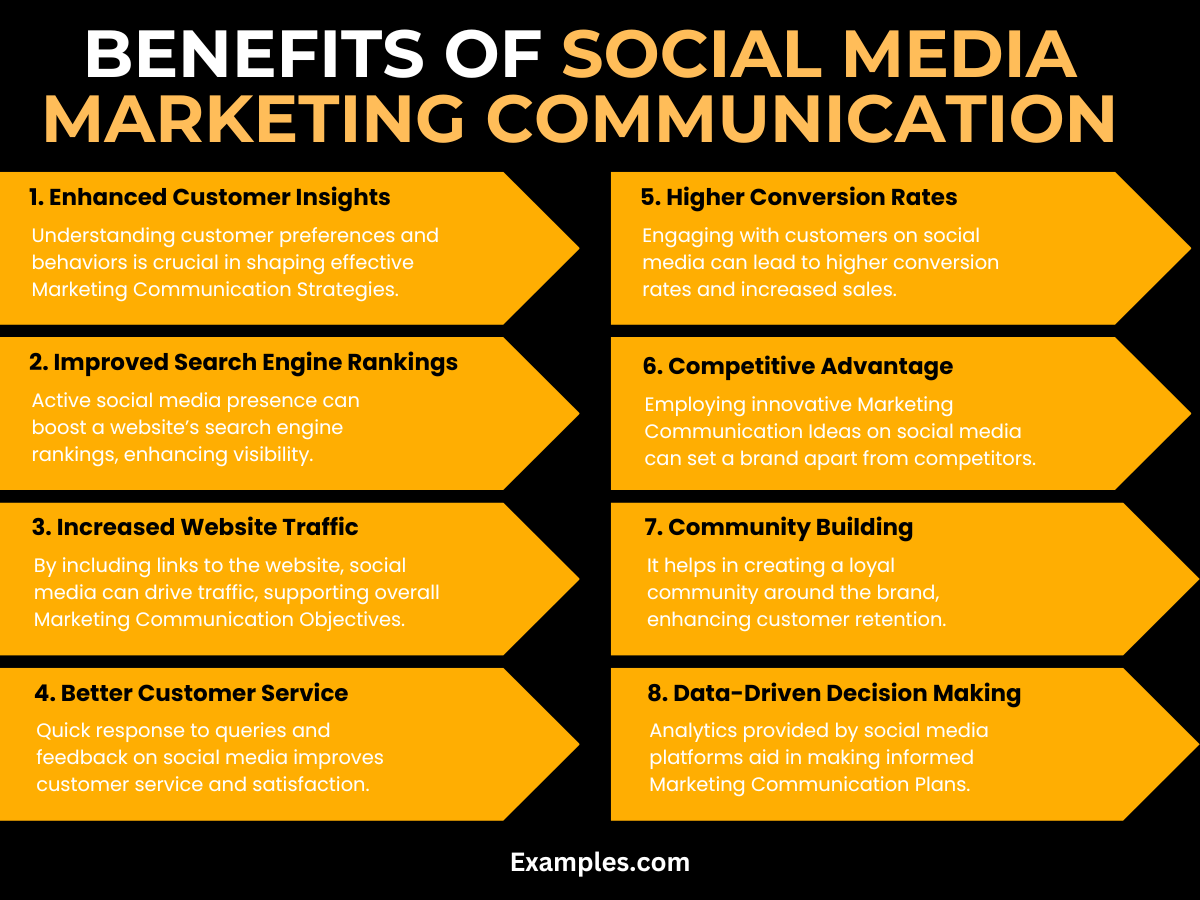
Social media marketing communication offers a myriad of benefits:
- Enhanced Customer Insights: Understanding customer preferences and behaviors is crucial in shaping effective Marketing Communication Strategies.
- Improved Search Engine Rankings: Active social media presence can boost a website’s search engine rankings, enhancing visibility.
- Increased Website Traffic: By including links to the website, social media can drive traffic, supporting overall Marketing Communication Objectives.
- Better Customer Service: Quick response to queries and feedback on social media improves customer service and satisfaction.
- Higher Conversion Rates: Engaging with customers on social media can lead to higher conversion rates and increased sales.
- Competitive Advantage: Employing innovative Marketing Communication Ideas on social media can set a brand apart from competitors.
- Community Building: It helps in creating a loyal community around the brand, enhancing customer retention.
- Data-Driven Decision Making: Analytics provided by social media platforms aid in making informed Marketing Communication Plans.
Incorporating these elements into a social media marketing strategy can greatly enhance the effectiveness and reach of Marketing Communication Efforts.
Communication Strategies for Social Media Marketing
- Define Clear Objectives: Establish clear marketing communication objectives for your social media presence. This could involve increasing brand awareness, driving sales, or improving customer service.
- Understand Your Audience: Tailor your messages to the specific needs and preferences of your target audience, taking into account demographics and behavioral patterns.
- Engage Actively: Social media thrives on engagement. Promptly respond to comments, participate in discussions, and create interactive content to foster a two-way communication process.
- Consistency is Key: Maintain a consistent brand voice and messaging across all social media platforms. This helps in strengthening your brand identity and enhances marketing communication effectiveness.
- Leverage Multimedia Content: Utilize various types of content like images, videos, and infographics. This diversification aligns with the marketing communication channels and increases audience engagement.
- Incorporate User-Generated Content: Encourage your followers to share their own content related to your brand. This boosts authenticity and trust in your marketing communication strategies.
- Monitor and Analyze: Use social media analytics tools to track the effectiveness of your communication strategies. This helps in refining your marketing communication plans based on real-time data.
- Stay Up-to-Date with Trends: Keep an eye on the latest social media trends and adapt your strategy accordingly. This approach ensures that your social media marketing communication remains relevant and impactful.
Role of Social Media in Marketing Communication
- Amplifying Brand Message: Social media platforms are powerful tools for disseminating brand messages widely, thus playing a crucial role in marketing communication examples.
- Direct Interaction with Customers: Social media allows for direct and immediate communication with customers, enhancing the process of marketing communication.
- Building Community: It’s pivotal in creating and nurturing online communities around brands, which is a vital aspect of marketing communication strategies.
- Customer Feedback and Insights: Social media provides a platform for customers to voice their opinions, giving valuable insights into the marketing communication process.
- Cost-Effective Promotion: Compared to traditional types of marketing communication, social media offers a more affordable way to reach a larger audience.
- Enhancing Customer Service: Through prompt responses and engagements, social media improves customer service, a key element in marketing communication objectives.
- Increasing Traffic and Sales: By driving traffic to websites and online stores, social media directly contributes to sales, aligning with the purpose of marketing communication.
- Influencer Partnerships: Collaborating with influencers on social media can significantly boost a brand’s visibility and credibility as part of a comprehensive marketing communication framework.
Incorporating these strategies and understanding the role of social media in marketing communication can significantly enhance a brand’s presence and effectiveness in reaching its audience.
Importance of Communication in Social Media Marketing
Effective marketing communication boosts engagement, builds brand trust, and fosters relationships, pivotal in conveying messages, addressing concerns, and aligning with audiences on social media.
Effectiveness of Social Media in Marketing Communication
Social media’s diverse platforms enable swift dissemination, interaction, and customization, aiding in targeted reach, amplification of brand messages, and fostering dialogue for effective marketing communication.
Working Mechanism of Social Media Marketing Communications
Social media leverages various marketing communication strategies, utilizing content, engagement tactics, and community-building efforts to convey brand messages, elicit responses, and catalyze conversions effectively.
In today’s digital age, effective Social Media Marketing Communication stands as a cornerstone in achieving marketing excellence. Employing creative Marketing Communication Strategies, businesses can engage with their audience more dynamically. Whether through compelling storytelling, interactive content, or personalized messaging, these strategies drive meaningful interactions, fostering brand loyalty and audience growth. Remember, the success of your brand’s story hinges on how well it resonates with your audience on social media. Keep innovating, stay relatable, and watch your marketing communication transform into impactful conversations.



